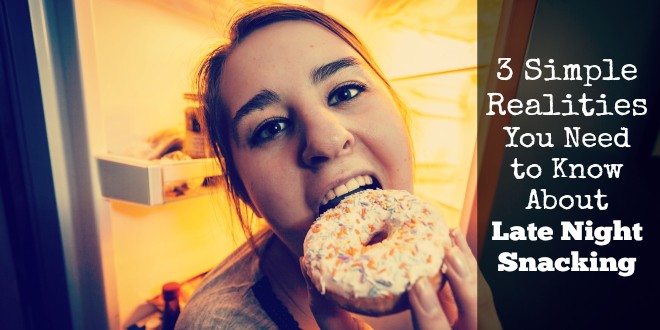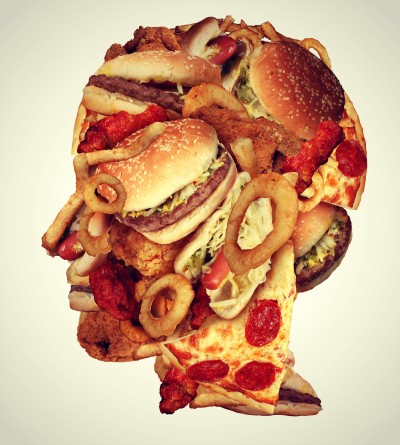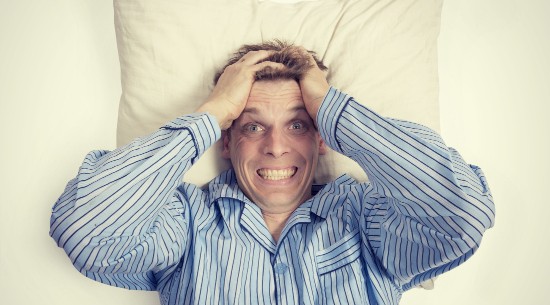3 Simple Realities You Need to Know About Late Night Snacking

The conversation about late night eating and WHY IT IS or IS NOT a major contributor to weight gain and obesity has been around for decades.
Almost all of us do it whether it’s a late day at work or you simply find yourself sitting in front of the TV at night, somewhat bored and craving something more satisfying than what we had for dinner only a few hours before.
[caption id="attachment_20283" align="alignright" width="301"] Fast Food on the brain? We are what we eat...[/caption]
Fast Food on the brain? We are what we eat...[/caption]
I distinctly remember, back in high school, a stretch of six weeks during my senior season of football. Every Friday was game day and the games would end at about 10pm. In the course of a football game I was burning several hundred calories from running from sideline to sideline as an outside linebacker. After the game, the pads would come off and I’d be soaked in sweat partially grossed out by how I felt, but at the same time pleased with how fit I felt from running around so much. Instantly thoughts of a steamy, delicious double cheeseburgers, hand-cut garlic fries with succulent bacon and three mixes of cheddar cheese melted on top, and a tall glass of ice-cold Dr. Pepper began to run through my mind.
In my mind eating all these high calorie, unhealthy foods was justifiable because I had worked so hard. Low and behold the next morning I could literally feel the bacon grease and oil sticking to the lining of my stomach (not really, but you get what I’m saying). My fit, football body felt like I had stopped exercising for six months and never touched a weight.
What happened? Didn’t I simply add back the calories I had burned during the game?
Bummer isn’t it? The hard work and exercise all of a sudden goes down the tube and I’m on my way to gaining pounds and pounds of unwanted fat. You may not even be consuming as many calories as I was that fateful night, but maybe for you it’s the Clif Bars and roast beef sandwiches after a great day of healthy eating, rock climbing, or life in general. You come home thinking you’re simply eating back the calories you 'burned' and after a few weeks you start noticing the weight gain, and more importantly you've noticed you aren't feeling so hot the morning after.
When it comes to the late night eating conversation, it’s important we get the facts right.
I've often wondered is their magical time of the day where our body decides to slow, or stop entirely, it’s metabolism causing any and all calories eaten to be turned to fat?
Thankfully, the answer to this is an emphatic "NO!"
However, there are 3 simple realities to be aware of if we head down the path of late night eating.
According to a study done by Oregon Health and Science University and Harvard Medical School researchers, everyone’s body has an internal clock known as the circadian system that is responsible for increasing “hunger and cravings for sweet, starchy, and salty foods in the evenings” (Shea, Ph.D, OHSU.edu).
[caption id="attachment_20288" align="aligncenter" width="500"] Kick the sugary treats to the curb... if they aren't at home, you won't eat them.[/caption]
Kick the sugary treats to the curb... if they aren't at home, you won't eat them.[/caption]
This can simply be known as a predisposition to eating unhealthy at nights. It is common sense not to eat a bacon cheeseburger during the day, so why would we have one at night before we go to bed?
We consume unhealthy foods at night because our body is simply predisposed to doing so. If you really think about the foods we eat at night, it’s really just us miscalculating our caloric, fat, protein, and carbohydrate intake. If we can make healthy choices that fit within our suggested daily intake, no weight gain is going to occur. However, should you opt for that chocolate chip Clif bar when you're already at your limit for the day, then you are going to feel it in the morning. This brings us to our next reality...
[caption id="attachment_20286" align="alignleft" width="301"] Ask yourself, am I eating late at night out of boredom?[/caption]
Ask yourself, am I eating late at night out of boredom?[/caption]
Researchers at Brigham Young University found the human brain to have a natural satisfaction craving when it comes to eating late at night. These researchers took several test subjects and proceeded to show them 360 images consisting of either low-calorie or high calorie foods. They used an MRI to watch brain activity throughout the study.
The inclination towards high calorie foods was not in the least surprising (candy, baked goods, ice cream, etc…), but they “were surprised to see lower reward-related brain re-activity to the food images in the evening” ( Masterson BYU, sciencedaily.com).
The conclusion is that we not only have a predisposition to eating high calorie foods, but we are also inclined to avoid healthy foods during our late night adventures.
Obesity Journal posted a study on adult men and women where the subjects “were either ‘late sleepers’, meaning the midpoint of their sleep cycles was 5:30 am or later or ‘normal sleepers’ whose mid-point were before 5:30 am” (O’Connor, nytimes.com).
[caption id="attachment_20285" align="aligncenter" width="550"] Poor night's sleep? Your food choices will reflect that[/caption]
Poor night's sleep? Your food choices will reflect that[/caption]
The late sleepers got five to six hours of sleep and the normal sleepers got seven to eight. After the study, the late sleepers all had a high body mass index while the normal sleepers maintained their weight.
So if you are eating later into the night and waking up five to six hours later, you are depriving yourself of sleep and setting yourself up to gain weight. In light of this study, it would be acceptable to say that late night eating is acceptable as long as you are still getting seven to eight hours of sleep.
At the end of the day you and I have a certain amount of calories, fats, proteins, and carbohydrates we need to consume to either support our current weight or lose the unwanted 'fat' weight.
It comes down to simple math and making sure the late night eating doesn't put us into a state of overeating from a calorie standpoint. We also need to be getting enough sleep to keep up our metabolism and normalize our appetite levels throughout the day by paying attention to our blood sugar and energy levels all day.
And of course, one point to note, the easiest choice is to choose NOT to eat double bacon-cheeseburgers, garlic fries, and a ginormous Dr. Pepper no matter how much physical activity you do!
[divider style="dashed" top="15" bottom="15"]
Daniel Chae is an entrepreneur, self-proclaimed foodie, and fitness fanatic. He loves to travel around the world to learn from other cultures in all areas of life. He now attends Baylor University. Connect with Daniel online at http://fittingandwinning.com/ and on Twitter at @DChae32
[caption id="attachment_20283" align="alignright" width="301"]
 Fast Food on the brain? We are what we eat...[/caption]
Fast Food on the brain? We are what we eat...[/caption]I distinctly remember, back in high school, a stretch of six weeks during my senior season of football. Every Friday was game day and the games would end at about 10pm. In the course of a football game I was burning several hundred calories from running from sideline to sideline as an outside linebacker. After the game, the pads would come off and I’d be soaked in sweat partially grossed out by how I felt, but at the same time pleased with how fit I felt from running around so much. Instantly thoughts of a steamy, delicious double cheeseburgers, hand-cut garlic fries with succulent bacon and three mixes of cheddar cheese melted on top, and a tall glass of ice-cold Dr. Pepper began to run through my mind.
In my mind eating all these high calorie, unhealthy foods was justifiable because I had worked so hard. Low and behold the next morning I could literally feel the bacon grease and oil sticking to the lining of my stomach (not really, but you get what I’m saying). My fit, football body felt like I had stopped exercising for six months and never touched a weight.
What happened? Didn’t I simply add back the calories I had burned during the game?
Bummer isn’t it? The hard work and exercise all of a sudden goes down the tube and I’m on my way to gaining pounds and pounds of unwanted fat. You may not even be consuming as many calories as I was that fateful night, but maybe for you it’s the Clif Bars and roast beef sandwiches after a great day of healthy eating, rock climbing, or life in general. You come home thinking you’re simply eating back the calories you 'burned' and after a few weeks you start noticing the weight gain, and more importantly you've noticed you aren't feeling so hot the morning after.
When it comes to the late night eating conversation, it’s important we get the facts right.
I've often wondered is their magical time of the day where our body decides to slow, or stop entirely, it’s metabolism causing any and all calories eaten to be turned to fat?
Thankfully, the answer to this is an emphatic "NO!"
However, there are 3 simple realities to be aware of if we head down the path of late night eating.
3 Simple Realities You Need to Know About Late Night Snacking
Reality #1: It's not the foods fault, it's Me
According to a study done by Oregon Health and Science University and Harvard Medical School researchers, everyone’s body has an internal clock known as the circadian system that is responsible for increasing “hunger and cravings for sweet, starchy, and salty foods in the evenings” (Shea, Ph.D, OHSU.edu).
[caption id="attachment_20288" align="aligncenter" width="500"]
 Kick the sugary treats to the curb... if they aren't at home, you won't eat them.[/caption]
Kick the sugary treats to the curb... if they aren't at home, you won't eat them.[/caption]This can simply be known as a predisposition to eating unhealthy at nights. It is common sense not to eat a bacon cheeseburger during the day, so why would we have one at night before we go to bed?
We consume unhealthy foods at night because our body is simply predisposed to doing so. If you really think about the foods we eat at night, it’s really just us miscalculating our caloric, fat, protein, and carbohydrate intake. If we can make healthy choices that fit within our suggested daily intake, no weight gain is going to occur. However, should you opt for that chocolate chip Clif bar when you're already at your limit for the day, then you are going to feel it in the morning. This brings us to our next reality...
Reality #2: We avoid healthy foods at night
[caption id="attachment_20286" align="alignleft" width="301"]
 Ask yourself, am I eating late at night out of boredom?[/caption]
Ask yourself, am I eating late at night out of boredom?[/caption]Researchers at Brigham Young University found the human brain to have a natural satisfaction craving when it comes to eating late at night. These researchers took several test subjects and proceeded to show them 360 images consisting of either low-calorie or high calorie foods. They used an MRI to watch brain activity throughout the study.
The inclination towards high calorie foods was not in the least surprising (candy, baked goods, ice cream, etc…), but they “were surprised to see lower reward-related brain re-activity to the food images in the evening” ( Masterson BYU, sciencedaily.com).
The conclusion is that we not only have a predisposition to eating high calorie foods, but we are also inclined to avoid healthy foods during our late night adventures.
Reality #3: Lack of Sleep plus Late Night Eating Leads to Weight Gain
Obesity Journal posted a study on adult men and women where the subjects “were either ‘late sleepers’, meaning the midpoint of their sleep cycles was 5:30 am or later or ‘normal sleepers’ whose mid-point were before 5:30 am” (O’Connor, nytimes.com).
[caption id="attachment_20285" align="aligncenter" width="550"]
 Poor night's sleep? Your food choices will reflect that[/caption]
Poor night's sleep? Your food choices will reflect that[/caption]The late sleepers got five to six hours of sleep and the normal sleepers got seven to eight. After the study, the late sleepers all had a high body mass index while the normal sleepers maintained their weight.
So if you are eating later into the night and waking up five to six hours later, you are depriving yourself of sleep and setting yourself up to gain weight. In light of this study, it would be acceptable to say that late night eating is acceptable as long as you are still getting seven to eight hours of sleep.
But, what does all of this mean?
At the end of the day you and I have a certain amount of calories, fats, proteins, and carbohydrates we need to consume to either support our current weight or lose the unwanted 'fat' weight.
It comes down to simple math and making sure the late night eating doesn't put us into a state of overeating from a calorie standpoint. We also need to be getting enough sleep to keep up our metabolism and normalize our appetite levels throughout the day by paying attention to our blood sugar and energy levels all day.
And of course, one point to note, the easiest choice is to choose NOT to eat double bacon-cheeseburgers, garlic fries, and a ginormous Dr. Pepper no matter how much physical activity you do!
[divider style="dashed" top="15" bottom="15"]
 Author Bio:
Author Bio:
Daniel Chae is an entrepreneur, self-proclaimed foodie, and fitness fanatic. He loves to travel around the world to learn from other cultures in all areas of life. He now attends Baylor University. Connect with Daniel online at http://fittingandwinning.com/ and on Twitter at @DChae32




































































































